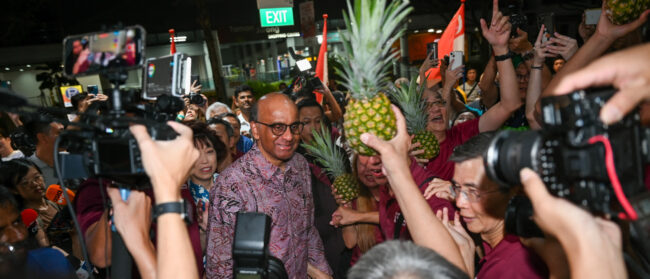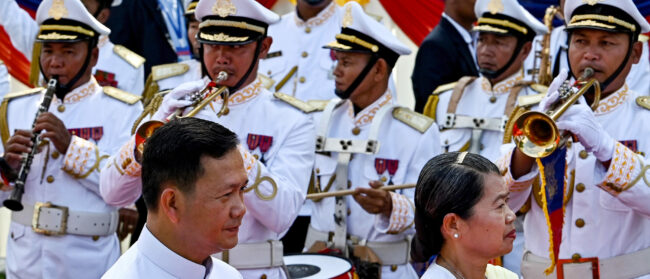Few guessed at the scale of the victory. Myanmar’s citizens lined up on the morning of November 8 under a shade of uncertainty. Euphoric campaign rallies hinted at a convincing win for the National League for Democracy (NLD), but faint suspicions remained that the Union Solidarity and Development Party (USDP), the military’s political proxy, would find some underhand way of bending the result in its favour. As the sun rose on Myanmar’s historic election, the atmosphere was one of trepidation mixed with mute, cautious determination.
And then, as the predawn gloom gave way to a hot high noon, any lingering concerns were washed out in a blizzard of red. In Mandalay, Myanmar’s second-largest city, voters emerged from polling stations beaming out their allegiance to the NLD and its beatific leader.
“This election is very important. That’s why I got here early,” said Tin Maung, 60, shortly after casting his vote for Aung San Suu Kyi’s party. “We want a good government, a clean government for our country.”
Ma Nila, a 32-year-old accountant, said: “People here have received a lot of pressure from the government in the past, so it’s time for that to change. I think there will be big changes.”
Needless to say, few equated change with the USDP, the political incarnation of the military that had ruled Myanmar as a dictatorship between 1962 and 2011.
The official results were stunning: by November 15, the Union Election Commission had declared the results of 488 seats in the Union Parliament, of which the NLD won 390 – just shy of 80%. The USDP won a paltry 41, with the rest going to smaller parties.
An estimated 30 million people took part in Myanmar’s historic election on November 8 – the first free national poll since 1990, when the NLD won a landslide victory that was disregarded by the army. By evening, thousands of red-clad NLD supporters had gathered at the party headquarters in Yangon, singing and dancing as the first euphoric figures were displayed on a massive screen.
Aye Lwin, the convener of the Islamic Centre of Myanmar, said the NLD had clearly benefited from “love votes” – votes for Aung San Suu Kyi’s charm, poise and charisma. But just as telling were the “hate votes” directed against a decrepit, military-crony establishment that has dominated the country for so long.
“People were fed up with those guys,” he said at his home in Yangon. “Every strata of society: farmers, labourers, students, and on top of this, civil servants – people were really fed up.”
The USDP’s defeat was encapsulated by the poor electoral showing of key party officials, many of them former top-ranking officers in the military junta that handed power to the semi-civilian government of President Thein Sein in 2011.
Among them was the once-powerful parliamentary speaker Shwe Mann, a perceived ally of Aung San Suu Kyi who was ousted from the USDP leadership in an internal party coup in August. Another was the USDP’s acting chairman Htay Oo, who conceded his constituency in Hinthada, west of Yangon, telling a reporter deflatedly: “We lost.”
Best symbolising the atmosphere of change, perhaps, was a military constituency near the capital Naypyidaw, where the former defence minister Wai Lwin lowered his colours to a poet. “The ballot is stronger than the bullet,” the NLD’s Maung Tin Thit, also a former political prisoner, told the New York Times.
First the election; now the long road ahead.
Phil Robertson, deputy Asia director at Human Rights Watch, said the NLD government, which is expected to take office in April next year, had a chance to make a “clean break” from the past. “With its overwhelming parliamentary majority, the best place to start is to take out the broom and get rid of the dozens of rights-abusing laws that have piled up over the course of British colonialism and 50 years of military dictatorship,” he said.
The new government will inherit some intractable – perhaps impenetrable – problems. Since its independence from Britain in 1948, Myanmar has been wracked by near-constant civil war and tensions between the ethnic Burman heartland and the country’s rugged peripheral regions, home to a diversity of ethnic minority peoples.
Then there is the alarming rise of anti-Muslim nationalism, which has created a dire situation in Rakhine State, on the country’s west coast. Violence that broke out there in 2012 drove 140,000 Muslim Rohingya into internal displacement camps.
These issues bled into the November 8 election: most of the estimated one million Rohingya were barred from voting or standing as candidates. Scores more ethnic minority voters were unable to cast a ballot after voting was cancelled in parts of Kachin State, Shan State and other areas plagued by instability.
“Despite the overwhelming NLD victory… there are millions of people left behind by the reforms and election,” said Mark Farmaner, director of Burma Campaign UK.
As a result of pressure from nationalist zealots, few parties – including the NLD – ran any Muslim candidates. This means that the new parliament will be the first in Myanmar’s history with no Muslim members. “People are scared,” said Kyaw Min, the Rohingya president of the Human Rights and Development Party. “For a long time, Muslims have not felt free or secure in this country.”
While the election represents a new beginning for a long-suffering country, deep-rooted challenges and the harsh realities of power in Myanmar are set to reimpose themselves.
For its own part, the outgoing USDP government has promised a peaceful and timely handover of power. At a gathering of Myanmar’s political parties on November 15, President Thein Sein said: “We will make sure it will be smooth and stable without having to worry about anything.”
Myanmar’s military, the Tatmadaw, has also said it will abide by the result – and it well might. Analysts say part of the reason for the military’s quiescence is that it more or less anticipated the outcome and has contingencies in place to safeguard its power.
Chief among these is the country’s constitution, drafted by the military junta and passed in a flawed referendum in 2008. The constitution reserves a quarter of parliamentary seats for military candidates and ensures the most powerful ministries – defence, home affairs, and border affairs – will remain under military control.
This means that budgets and bureaucracies reaching down to the township level will remain under military control, regardless of which government is in power. Sealing the military’s domination is a keystone provision, Article 436, which requires a 75% supermajority to amend the charter, effectively giving the military a veto over any changes.
All this suggests serious limitations to the power the NLD government will have to usher Myanmar toward peace, democracy and economic development.
Tom Kramer, a researcher at the Amsterdam-based Transnational Institute, said the opposition would have to establish a stable working relationship with the military to end the country’s endemic ethnic conflicts.
“The army is still there and they’re very, very powerful,” he said, “and that means a lot of negotiation, a lot of give and take by the NLD. You cannot rule the country without them.”
This in turn implies a tough choice for the NLD between the imperatives of peace – of a lasting, inclusive solution to the strife in Myanmar’s troubled ethnic areas – and other core aims.
On several occasions, Suu Kyi has stated her chief priority will be to reform the constitution, targeting two provisions: Article 436, the ‘keystone’ provision; and Article 59(f), which bars Suu Kyi from holding the presidency on the grounds that her late husband was a foreigner and their two children are British citizens.
Ko Ni, a lawyer who serves as an advisor to the NLD, and the author of the book How to Amend Myanmar’s Constitution, admitted that amending the constitution formally would be impossible without the consent of the military commander-in-chief, Min Aung Hlaing. Which, of course, is exactly the point.
The party’s only other option would be to pursue an “extra-constitutional” strategy, tabling a proposal to scrap the charter, rewriting it and holding new elections. All this, he said, requires just 50%+1 of the vote in parliament. “If we write a proposal, we can show many reasons why this constitution is not actually
a democratic constitution, and not a federal constitution,” he said.
True enough. But whether the party can press for this goal in the next five years without risking friction with the military, and therefore marring progress on other fronts, remains doubtful.
Farmaner of Burma Campaign UK said there was little chance the military would acquiesce to rewriting of the constitution. “People keep talking about the elections as a step in a process of transition, but as far as the military are concerned the transition is now complete. No further steps are required,” he said.
Whatever happens, Myanmar’s next government will include, in uneasy proximity, two long-time rivals: an NLD still flush with victory and a chastened, yet still powerful, military. Some irony: for years, these two parties represented the poles of the country’s political struggle. Now the future may well hinge on how they manage to get along.


